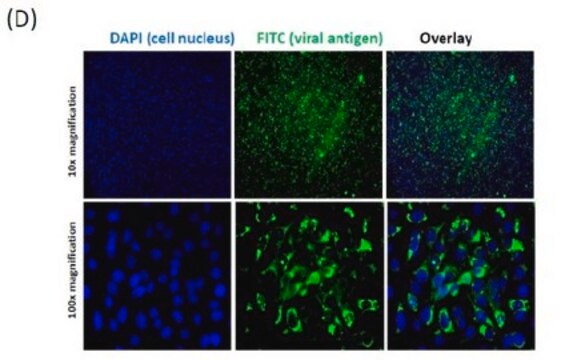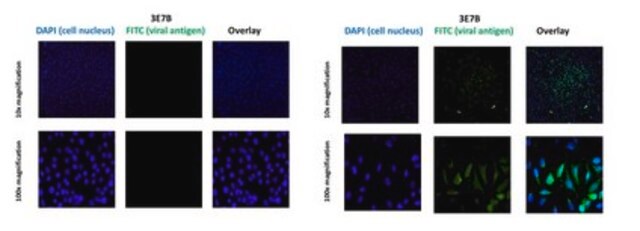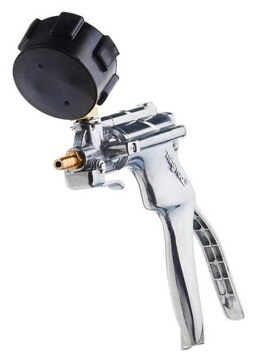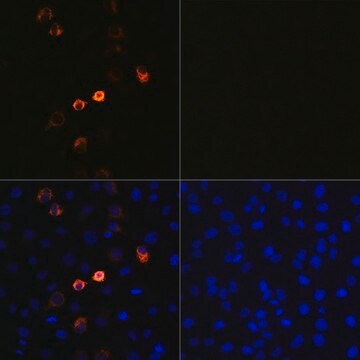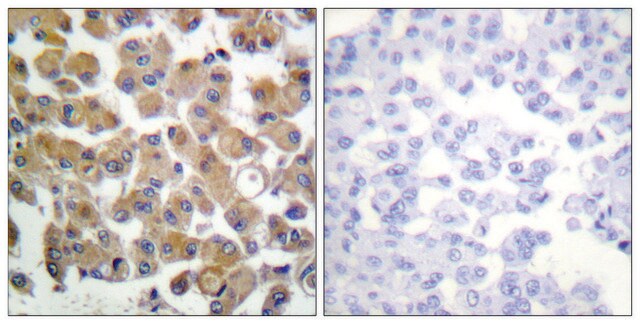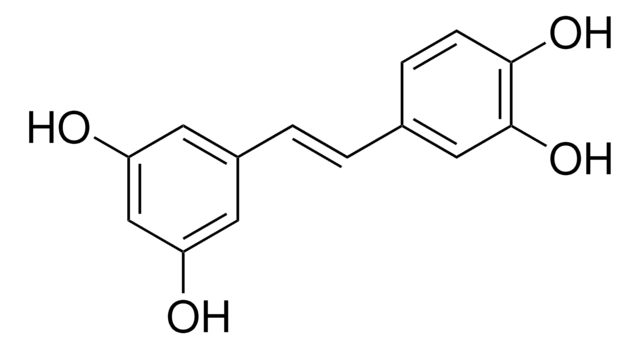おすすめの製品
由来生物
mouse
品質水準
結合体
unconjugated
抗体製品の状態
purified antibody
抗体製品タイプ
primary antibodies
クローン
CHK-152, monoclonal
分子量
calculated mol wt 138.07 kDa
精製方法
using protein G
化学種の反応性
virus
包装
antibody small pack of 100 μL
テクニック
ELISA: suitable
inhibition assay: suitable
neutralization: suitable
アイソタイプ
IgG2κ
エピトープ配列
Unknown
UniProtアクセッション番号
輸送温度
dry ice
ターゲットの翻訳後修飾
unmodified
詳細
Chikungunya virus (CHIKV) that causes distinctive polyarthritis or polyarthralgia with clinical features such as fever, maculopapular rash, and myalgia is transmitted by Aedes spp of mosquitoes. Immune compromised individuals may face serious complications, including encephalitis and mortality. CHIKV genome contains a single-stranded positive-sense RNA that encodes four non-structural proteins known as nsP1, nsP2, nsP3, and nsP4 and also five structural proteins that include a capsid protein, three envelope glycoproteins known as (E1, E2, and E3, and a small molecule known as 6K. The mature alphavirus particles express E1 and E2 heterodimers that form 80 trimeric spikes on the surface of the virion. The mature E2 protein contains three domains with immunoglobulin-like folds: N-terminal domain A, domain B at the tip; and the C-terminal domain C located proximal to the viral membrane. The ectodomain E1 protein consists of three domains known as D1, DII, and DIII. The DIII domain is an immunoglobulin-like domain connected to D1 and DII by a flexible linker. Both E1 and E2 proteins are responsible for virus entry into host cells. The E2 glycoprotein interacts with a cellular receptor, resulting in the virus internalization and the E1 glycoprotein mediates virus fusion to host cell under low pH conditions. Following the fusion of the viral envelope with the endosomal membrane, the viral genomic RNA is released into the cytoplasm and starts replicating. Clone CHK-152 is a humanized antibody that blocks viral fusion and is shown to protect mice against CHIKV-induced mortality and disease. (Ref.: Zhang, R., et al. (2019). Cell Reports 28(10); 2647-2658; Pal, P., et al. (2013). PLoS Pathog. 9(4); e1003312).
特異性
Clone CHK-152 is a humanized mouse monoclonal antibody that specifically detects E2 protein in Chikungunya virus. It targets an epitope on A domain of E2.
免疫原
Irf-7 deficient mice injected with La Reunion 2006 OPY-1 strain of Chikungunya virus (CHIKV-LR) and boosted with CHIKV virus-like particles and E2 protein.
アプリケーション
Quality Control Testing
Evaluated by ELISA with recombinant Chikungunya Virus E2 Envelope Protein.
ELISA Analysis: Various dilutions of this antibody detected recombinant Chikungunya virus E2 protein.
Tested Applications
Surface plasmon resonance: A representative lot detected Chikungunya virus E2 in Surface plasmon resonance applications (Pal, P., et al. (2013). PLoS Pathog. 9(4):e1003312).
Neutralizing Analysis: A representative lot neutralized CHIKV and protected immunocompromised mice against disease. (Pal, P., et al. (2013). PLoS Pathog. 9(4):e1003312).
ELISA Analysis: A representative lot detected Chikungunya virus E2 in ELISA applications (Zhang, R., et al. (2019). Cell Rep. 28(10):2647-2658.e5).
Inhibition Analysis: A representative lot inhibited CHIKV infection when added after virus adsorption to cell surface. (Pal, P., et al. (2013). PLoS Pathog. 9(4):e1003312).
Note: Actual optimal working dilutions must be determined by end user as specimens, and experimental conditions may vary with the end user
Evaluated by ELISA with recombinant Chikungunya Virus E2 Envelope Protein.
ELISA Analysis: Various dilutions of this antibody detected recombinant Chikungunya virus E2 protein.
Tested Applications
Surface plasmon resonance: A representative lot detected Chikungunya virus E2 in Surface plasmon resonance applications (Pal, P., et al. (2013). PLoS Pathog. 9(4):e1003312).
Neutralizing Analysis: A representative lot neutralized CHIKV and protected immunocompromised mice against disease. (Pal, P., et al. (2013). PLoS Pathog. 9(4):e1003312).
ELISA Analysis: A representative lot detected Chikungunya virus E2 in ELISA applications (Zhang, R., et al. (2019). Cell Rep. 28(10):2647-2658.e5).
Inhibition Analysis: A representative lot inhibited CHIKV infection when added after virus adsorption to cell surface. (Pal, P., et al. (2013). PLoS Pathog. 9(4):e1003312).
Note: Actual optimal working dilutions must be determined by end user as specimens, and experimental conditions may vary with the end user
Anti-Chikungunya virus E2, clone CHK-152, Cat. No. MABF2733, is a mouse monoclonal antibody that detects E2 protein in Chikungunya virus (CHIKV) and is tested for use in ELISA, Inhibition, Neutralizing, and Surface plasmon resonance.
物理的形状
Purified mouse monoclonal antibody IgG2a in PBS without azide.
保管および安定性
Store at -10°C to -25°C. Handling Recommendations: Upon receipt and prior to removing the cap, centrifuge the vial and gently mix the solution. Aliquot into microcentrifuge tubes and store at -20°C. Avoid repeated freeze/thaw cycles, which may damage IgG and affect product performance.
その他情報
Concentration: Please refer to the Certificate of Analysis for the lot-specific concentration.
免責事項
Unless otherwise stated in our catalog or other company documentation accompanying the product(s), our products are intended for research use only and are not to be used for any other purpose, which includes but is not limited to, unauthorized commercial uses, in vitro diagnostic uses, ex vivo or in vivo therapeutic uses or any type of consumption or application to humans or animals.
適切な製品が見つかりませんか。
製品選択ツール.をお試しください
保管分類コード
12 - Non Combustible Liquids
WGK
WGK 2
引火点(°F)
Not applicable
引火点(℃)
Not applicable
適用法令
試験研究用途を考慮した関連法令を主に挙げております。化学物質以外については、一部の情報のみ提供しています。 製品を安全かつ合法的に使用することは、使用者の義務です。最新情報により修正される場合があります。WEBの反映には時間を要することがあるため、適宜SDSをご参照ください。
Jan Code
MABF2733-25UL:
MABF2733-100UL:
試験成績書(COA)
製品のロット番号・バッチ番号を入力して、試験成績書(COA) を検索できます。ロット番号・バッチ番号は、製品ラベルに「Lot」または「Batch」に続いて記載されています。
ライフサイエンス、有機合成、材料科学、クロマトグラフィー、分析など、あらゆる分野の研究に経験のあるメンバーがおります。.
製品に関するお問い合わせはこちら(テクニカルサービス)